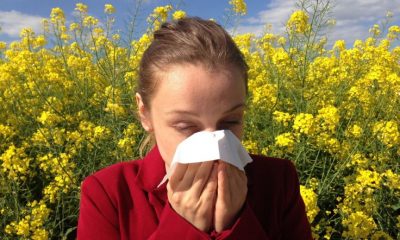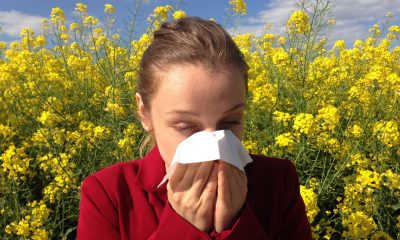If you’re constantly sneezing, coughing, or experiencing a sore throat, the first thing you might think about is colds or flu. It is actually difficult to distinguish because they have similar symptoms. However, those can also be signs of allergies. Colds, flu, and allergy affect your respiratory system, mainly the nose and throat, which commonly causes sneezing.
Since the COVID-19 virus is still out there, you might also be concerned about whether the symptoms you’re experiencing—like sneezing—are COVID-related or just an allergy. It is important to understand their differences to help you choose the right treatment or method of relief.
Differences Between Colds, Flu, and Allergy
Colds and flu are contagious respiratory illnesses caused by viruses. Flu is caused by influenza viruses specifically, while common colds can be caused by different viruses, such as rhinoviruses and parainfluenza, and several coronaviruses (from the same family of viruses as SARS-CoV-2, which causes COVID-19). Both can cause a runny or stuffy nose, congestion, coughing, sneezing, and sore throat.
Flu can cause a high fever that lasts for three to four days, as well as headache, fatigue, and general aches and pains. It can lead to serious complications like pneumonia. On the other hand, colds are usually milder than flu and do not typically result in severe health problems. People with colds are more likely to have a runny or stuffy nose.
While flu and colds are contagious, an allergy can not be passed from one person to the other. Once you inhale a substance (also called an allergen) you are allergic to, such as pollen, dust mites, mold, animal dander, and other substances that are not infectious, your immune system will react to it, causing your nose to become stuffy or runny. Allergies typically last for as long as you’re exposed to the allergen. It can be up to six weeks during the spring, summer, and fall pollen seasons.
Allergy: Symptoms and Treatments
Your body produces IgE (immunoglobulin E) antibodies when encountering allergens that can inflame your skin, sinuses, and airways. They cause the release of chemicals like histamine, which results in swelling and inflammation. As your body tries to get rid of the allergens, you may experience symptoms such as a runny nose, itchy or watery eyes, rashes, and sneezing.
Allergy symptoms depend on the substance involved. Allergic reactions can range from mild to severe. In some severe cases, it can cause a potentially fatal reaction known as anaphylaxis. There are also different types of allergies:
- Seasonal allergy (Pollen allergy, dust allergy, hay fever)
- Mold allergy
- Pet allergy
- Food allergy
- Drug allergy
- Skin allergy
- Eye allergy
- Insect sting allergy
- Latex allergy
One of the most effective and natural ways to prevent or manage allergy symptoms is to avoid triggers or allergens. Since allergens are everywhere, making it difficult to avoid, you can take medications to relieve your symptoms. Antihistamines, corticosteroids, and decongestants can be used to treat minor allergy symptoms.
If your symptoms are no longer manageable with over-the-counter medications, you should see a healthcare provider to determine if you might benefit from other treatments. If you are experiencing a severe allergic reaction like anaphylaxis, you must seek medical care immediately.
Why Do You Sneeze When You Have an Allergy?
Many of you might be wondering why people are sneezing when experiencing allergies. Allergens commonly target the nose and sinuses, so your immune system will create a protective response like sneezing or coughing. It triggers the release of the harmful substance, alerting the brain to sneeze to force the allergen out of your system.
When you’re cleaning the house or simply walking outside, you may notice that you’re suddenly sneezing a lot. It is probably because you inhale dust or pollen, causing irritation. When these substances enter your body, it responds by releasing histamine to attack the invading allergens through sneezing.
Accessible Allergy Blood Test
More than 50 million Americans suffer from allergies each year. However, most people are unaware of the allergen or allergens causing their symptoms. Allergies generally cannot be prevented, but allergic reactions can be. Once you know you’re allergic to a substance, you can identify strategies that help you avoid the allergen. Strategies include being in an air-conditioned environment during peak hay fever season or eliminating dust mites and animal dander from your home.
According to AllergyInsider.com, up to 80 percent of people with allergies are sensitized to multiple things, making it complicated to track symptoms back to the specific sources. This underlies the reason to take an allergy blood test. Labcorp OnDemand has an Indoor and Outdoor Allergy Test that can easily assess potential allergens so you can seek the necessary treatment and lifestyle modifications.
The Labcorp OnDemand Indoor and Outdoor Allergy Package includes the following:
- Dust Mite (D pteronyssinus)
- Dust Mite (D farinae)
- Cat Dander
- Dog Dander
- Mouse Urine
- German Cockroach
- Bermuda Grass
- Kentucky Bluegrass
- Leaf Mold
- White Oak
- American Elm
- Short Ragweed
- English Plaintain (Lamb’s Tongue)
- Sheep Sorrel
Simply shop for the test at Labcorp OnDemand and pay via a credit card or HSA/FSA. You can then schedule an appointment or walk in to nearly 2,000 convenient Labcorp locations for a quick blood collection.
In a few days, you will be notified to access and view your easy-to-read results online in your Labcorp OnDemand account. You can also download your results if you need a copy or bring them to the doctor.
Labcorp OnDemand’s Indoor and Outdoor Allergy Package is one of the most helpful ways to manage and understand your allergies. It will also guide you to make informed decisions about your health and the surrounding environment during allergy season or year-round.
Although allergies are typically not severe, please keep in mind that you need to consult a doctor if your allergy causes trouble breathing, persists for many months or returns frequently.
To learn more about Labcorp OnDemand and the portfolio of tests that can be purchased, please visit OnDemand.Labcorp.com



















